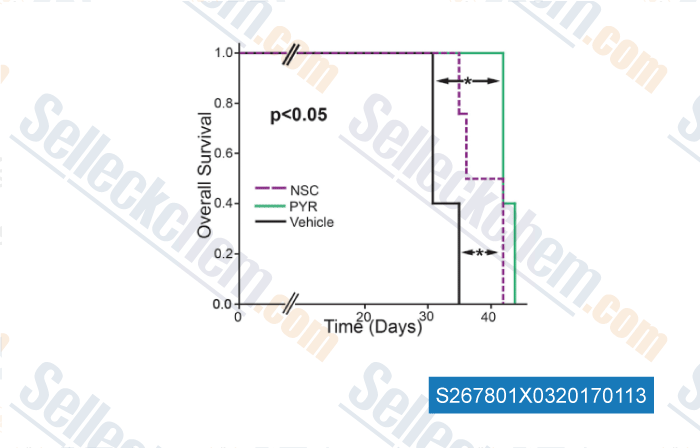|
Toll Free: (877) 796-6397 -- USA and Canada only -- |
Fax: +1-832-582-8590 Orders: +1-832-582-8158 |
Tech Support: +1-832-582-8158 Ext:3 Please provide your Order Number in the email. |
Technical Data
| Formula | C11H13N5O4 |
|||
| Molecular Weight | 279.25 | CAS No. | 58131-57-0 | |
| Solubility (25°C)* | In vitro | DMSO | 36 mg/mL (128.91 mM) | |
| Water | Insoluble | |||
| Ethanol | Insoluble | |||
|
* <1 mg/ml means slightly soluble or insoluble. * Please note that Selleck tests the solubility of all compounds in-house, and the actual solubility may differ slightly from published values. This is normal and is due to slight batch-to-batch variations. * Room temperature shipping (Stability testing shows this product can be shipped without any cooling measures.) |
||||
Preparing Stock Solutions
Biological Activity
| Description | NSC 207895 (XI-006) suppresses MDMX with IC50 of 2.5 μM, leading to enhanced p53 stabilization/activation and DNA damage, and also regulates MDM2, an E3 ligase. | ||
|---|---|---|---|
| Targets |
|
||
| In vitro | NSC-207895 decreases both the MDMX mRNA and protein in MCF-7 cells. NSC-207895 induces expression of p53 as well as well-characterized p53-target gene, p21 and MDM2, in a dose-dependent manner in MCF-7 cells. NSC-207895 extends the half-life of p53 from 20 to 30 minutes to more than 3 hours as revealed by cycloheximide chase assays in MCF-7 cells. NSC-207895 also activates p53 and induces p21 and MDM2 expression in LNCaP prostate and A549 lung cancer cells. NSC-207895 increases the mRNA levels of proapoptotic genes including PUMA, BAX, and PIG3 in a dose-dependent manner in MCF-7 cells. NSC-207895 results in a significant increase in the numbers of sub-G0/G1 cells as well as G2 arrest. NSC-207895 also results in more than 40% of cells dying via apoptosis and decreases cell viability in A549 and LNCaP cells. [1] NSC-207895 inhibits biosynthesis of nucleic acids and proteins in L1210 cells. [2] NSC-207895 interacts with DNA repair to activate the DNA damage repair pathway in three species (S. cerevisiae, S. pombe and H. sapiens). [3] NSC-207895 acts as cytotoxic agent in the G/R-luc astrocytoma cell line with GI50 of 117 nM. [4] |
Protocol (from reference)
| Cell Assay: |
|
|---|
References
Customer Product Validation

-
Data from [Data independently produced by , , Stem Cell Reports, 2016, 7:1140-1151.]
Selleck's NSC 207895 has been cited by 9 publications
| Integrated drug response prediction models pinpoint repurposed drugs with effectiveness against rhabdomyosarcoma [ PLoS One, 2024, 19(1):e0295629] | PubMed: 38277404 |
| 125I Seed Promotes Apoptosis in Non-small Lung Cancer Cells via the p38 MAPK-MDM2-p53 Signaling Pathway [ Front Oncol, 2021, 11:582511] | PubMed: 33968713 |
| MDM2 and MDMX promote ferroptosis by PPARα-mediated lipid remodeling. [ Genes Dev, 2020, 34(7-8):526-543] | PubMed: 32079652 |
| Identification of Mubritinib (TAK 165) as an inhibitor of KSHV driven primary effusion lymphoma via disruption of mitochondrial OXPHOS metabolism [ Oncotarget, 2020, 11(46):4224-4242] | PubMed: 33245718 |
| DRUGPATH - a novel bioinformatic approach identifies DNA-damage pathway as a regulator of size maintenance in human ESCs and iPSCs [ Sci Rep, 2019, 9(1):1897] | PubMed: 30760778 |
| MiR-370 promotes apoptosis in colon cancer by directly targeting MDM4. [ Oncol Lett, 2018, 15(2):1673-1679] | PubMed: 29434862 |
| The protective effect of PFTα on alcohol-induced osteonecrosis of the femoral head [ Oncotarget, 2017, 8(59):100691-100707] | PubMed: 29246013 |
| The protective effect of PFTα on alcohol-induced osteonecrosis of the femoral head [ Oncotarget, 2017, 8(59):100691-100707] | PubMed: 29246013 |
| Inhibiting the SUMO Pathway Represses the Cancer Stem Cell Population in Breast and Colorectal Carcinomas. [ Stem Cell Reports, 2016, 7(6):1140-1151] | PubMed: 27916539 |
RETURN POLICY
Selleck Chemical’s Unconditional Return Policy ensures a smooth online shopping experience for our customers. If you are in any way unsatisfied with your purchase, you may return any item(s) within 7 days of receiving it. In the event of product quality issues, either protocol related or product related problems, you may return any item(s) within 365 days from the original purchase date. Please follow the instructions below when returning products.
SHIPPING AND STORAGE
Selleck products are transported at room temperature. If you receive the product at room temperature, please rest assured, the Selleck Quality Inspection Department has conducted experiments to verify that the normal temperature placement of one month will not affect the biological activity of powder products. After collecting, please store the product according to the requirements described in the datasheet. Most Selleck products are stable under the recommended conditions.
NOT FOR HUMAN, VETERINARY DIAGNOSTIC OR THERAPEUTIC USE.
